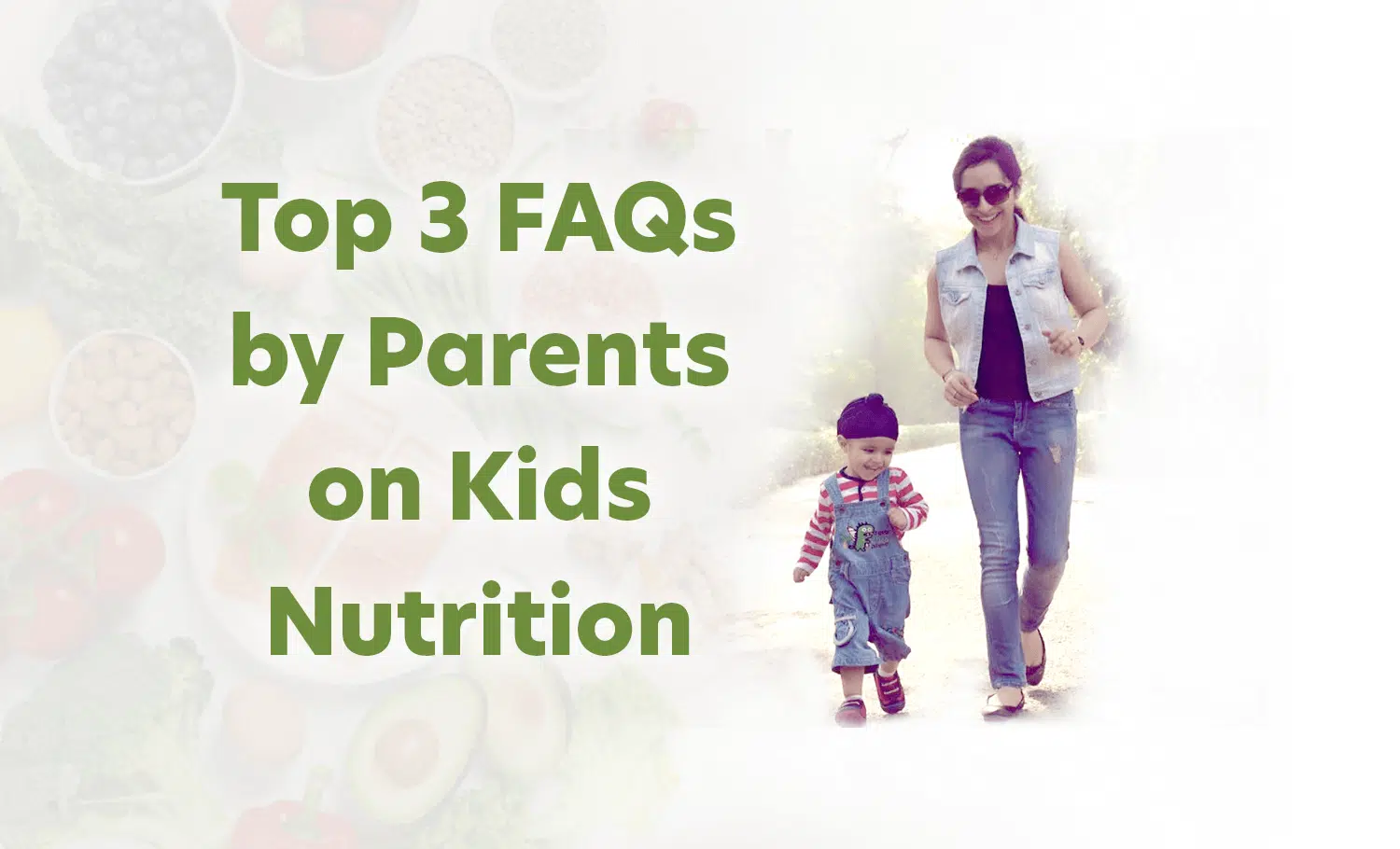As parents, we have great concerns about our children’s nutrition. This blog post is for all fathers, and mothers– for all the parents out there. For parents, children’s well-being is always a matter of concern. Diet plays a crucial role in their health and development. In this blog post, I will answer the top 3 frequently asked questions by parents about their children’s nutrition. Let’s create a positive eating environment for our kids for their well-being.
But before that, I have a few questions for Parents. For that let’s go back in our past, in our childhood.
If you rewind and go to your childhood days you will agree our childhood was great. We used to take parathas with pickles to school, and it was so much fun. The smell of those parathas and pickles would fill the classroom. But things have changed now. Our schools no longer allow pickles in lunchboxes. Moms are always worried about what to pack in their kids’ lunchboxes for Monday through Friday. It’s a big concern these days.
We, as parents, are always concerned about our children’s nourishment. But what if you have two or three kids to look after? It can be a challenge. Back in the day, the whole family would eat together, and kids used to start eating without much fuss. There weren’t major worries about nutrition. But now, with a nuclear family set up with one or two kids, we’re so concerned about making sure they eat well. Moms are always worried about what foods to give, like fruits, veggies, or dry fruits. The main concern is that children should EAT. So, we’ve set an unsaid rule: Children should eat before leaving in the morning, whether hungry or not. The first FAQ is in this regard only that I would like to answer
FAQ 1: What should children be given before going to school in the morning?

Ans: Deciding what to give your child before school can be tricky. I would suggest it depends on their hunger. If the child gets up early at 6:00 am and is rushing to catch the bus, forcing them to eat might upset their stomach. Especially if they had dinner the night before, forcing milk or fruits in the morning is too much. It might not go well with their digestion and you are overdoing it then.
So, here’s the thing – we often associate cholesterol directly with heart health. Many believe that high cholesterol levels affect the heart. I’d like to clarify this common misconception. Cholesterol is made up of 80% glucose and 20% healthy fats. So cholesterol has a direct relation with our insulin management. If your glucose levels are not well-controlled, especially in cases of diabetes, there is a higher chance of increased cholesterol. This is because about 80% of cholesterol is produced from glucose in our body. Our body needs healthy fats for a healthy heart. People avoid ghee and oils considering it harmful. Saturated fats like desi ghee and medium-chain triglycerides from coconut are good sources of healthy fats.
The vitamin E found in almonds, walnuts, sunflower seeds, and pumpkin seeds is essential for heart health. These foods help in the absorption of fat-soluble vitamins A, D, E, and K. These vitamins help improve our heart health.
So, Ghee leads to increased cholesterol and is harmful to the heart is a misconception. Cholesterol available from animal sources is harmful and not thoask our kids if they’re hungry, and we need to give them the chance to speak up. Maybe something is bothering them—fears or anxieties we haven’t heard about. We need to give them a chance to share. If their routine doesn’t match their hunger in the morning, it’s okay not to force-feed them. It’s all about what their body needs on that specific day. Don’t assume they’re hungry because you haven’t fed them. Trust me, they’ll manage their hunger and will be better at handling their hunger. This will help them choose healthier foods and develop the habit of Mindful eating. Forcing them to eat might bring in negative emotions for foods and disturb their nourishment.
So, if they need breakfast before school, feed them. If not, don’t force it. Don’t use statements like ‘you’ll be hungry all day‘ or ‘you won’t be able to concentrate.‘ Instead, give them enough to keep them satisfied until their first break at school. Even a small snack, like a few dry fruits, is fine. Nowadays, even the school suggests sending kids after feeding something. Avoid pressuring your child to finish a full meal or drink milk before leaving for school. Remember, a child’s ability to understand their hunger is an important skill. We should give them the chance to develop the skill of mindful eating.
FAQ 2: My child eats with gadgets on. What should I do?

Ans: A lot of parents are worried because their kids always have gadgets in front of them, whether it’s a laptop, TV, or a mobile phone while eating. They are eating with YouTube videos playing in front of them, and it’s a common concern. Now, what should we do about it?
Let me break it down. First of all, we need to figure out where this habit started. We used gadgets as a shortcut to quickly feed them since their childhood. Considering we’re busy or think they won’t eat otherwise, we always make them watch YouTube videos or TV or mobile while eating. By doing this we’ve put ourselves in a tough spot. We jumped into a hole, metaphorically. Accept that we have set this habit. Now, you might be thinking, “How do I get my kid to stop with the gadgets while eating?” So first, accept that you have made the mistake and then try to change the situation. We need to understand that our child’s brain releases dopamine, ( The happy hormone ) when they’re entertained with videos while eating. So, If we want our children to eat without gadgets, but still keep that dopamine flowing, we need to replace the entertainment. We want to keep that feeling without the screens. I’m not saying you should start dancing (unless your kid is into that), but you do need to spend time with your child. Sit with them, share stories – make it enjoyable. If your child has developed the habit of eating with gadgets, it’s essential to acknowledge that this habit was developed over time. To change this behavior, start by shifting from screen time to audio, if they are watching videos. Next, reduce the audio as well. Followed by creating a family environment where the child can enjoy meals without boredom or monotony. The reason many children eat with gadgets is that it releases dopamine, the “happy hormone.” To enjoy mealtime without screens, you need to make mealtime enjoyable. Spending quality time with your child, engaging in conversations, and creating positive interactions during meals is a must.
In short, avoid forming the habit of eating with gadgets from the start. If the habit is already there and needs changing, take it one step at a time, with care and patience. Parents, it’s a patience game. Accept that your child is used to gadgets. Start by switching to audio-only, so if they’re watching videos, suggest listening. Drop the audio and video bit by bit. Get them to sit with the family and eat together. Positive interactions are key to keep them from getting bored with food. Spend time with them, eat together, talk – distract them. Initially, they might get annoyed – “Don’t disturb me, I want to watch TV.” But keep those interactions positive. That’s the plan, and that’s how we break the gadget-eating habit, step by step. The goal is to make mealtime a pleasant and engaging experience without gadgets.
FAQ 3: My child is more inclined towards junk food or refuses to eat properly. What can be done?

Answer: If your child is inclined towards junk food or has poor eating habits, it’s important to deal with this issue. It could be a sign they’re missing essential nutrients or moving toward obesity from too much junk and sitting all day. As a dietitian in India, I can provide you with specialized advice tailored to your child’s nutritional needs and the cultural nuances of our region.
We must realize that what a child becomes during adolescence often reflects what they were exposed to before puberty. If you have established good eating routines from ages 8 to 10, there may be fewer issues during puberty. If your child’s nutrition is incomplete or if they are becoming obese, you should pay attention. Changes happen as children grow. During puberty, calcium and iron needs increase, and nutritional requirements almost double. The solution is not about focusing on the kids but on parents changing their routines. Parents set the example. Limit junk at home, and allow treats on weekends only. Avoid storing biscuits, snacks, or sugary items in the pantry. Ensure that self-discipline is part of your daily routine. Your habits will influence your child’s choices. Remember, you’re doing this not only for your child but also for yourself.
Be a role model – the child watches and learns.
By following these guidelines, parents can address common concerns about their children’s nutrition. It helps to create a healthy and positive mealtime family environment.
Our Wellness Program batch 17 has already begun from 18th November. Here’s a chance to stay healthy – don’t let it slip by. You won’t ever regret it.




